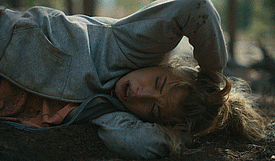Filth, drugs, debauchery and tea shops

Imogen Poots arranges to meet in a tea shop. The music is gentle and the air smells of pine. The decor sparkles white and the drinks sound like fairytales – Enchanted Forest, Gentle Giant, Russian Caravan. A scene from her new film, Filth, pops into my head. Detective sergeant Bruce Robertson (James McAvoy) is having rough sex with a colleague’s wife; she tightens a belt around his neck as he screams at her to “cut off the gas”. The cafe feels wrong. It would be tough work talking self-annihilation over a cup of Caramel Sweetheart. So we head to a pub, squish into seats next to the bog and order a real drink.
If you’ve never heard of Poots, Filth won’t help. The film adaptation of Irvine Welsh’s scabrous novel follows McAvoy’s grieving policeman as he buries his beak into a cocktail of addictions: booze, drugs and joyless sex. Poots is Amanda Drummond, the lone female officer in a force on the slide. Around her roves a carnival of nice actors doing nasty things: McAvoy snorts and screams; Eddie Marsan dopes up and heads for the disco; Jamie Bell tunnels into a cocaine Mont Blanc. Poots stands in the midst of the madness, watching the boys go wild.
A lesser actor could get lost in the melee, but the 24-year-old has developed a knack for making a second-fiddle part sing. Last year A Late Quartet had her shuttling between Philip Seymour Hoffman and Catherine Keener as the renegade offspring of world-famous musicians whose relationship had hit a bum note; in 2011, Michael Fassbender’s Mr Rochester nearly married her in Cary Fukunaga’s Jane Eyre. And an early role in A Solitary Man saw Michael Douglas’s ageing reprobate led up the garden path by Poots’s saucy teen. Each time she was there as a catalyst, prepping the audience for the bigger, broader star turn. Filth, a brash 90s homage with a hole in its head and a pill in its belly, offers her a role of a kind.
“She’s a foundation for the rest of the stereotypes,” says Poots. “Bruce is revealed as being this hideous human being, but it’s also the people around him – no one’s really speaking up and that’s a huge flaw in itself. That’s why it’s terrific. Irvine Welsh has this knack of creating something that’s socially important, but also it’s just a really, really good fucking story.”
Poots is fun company. She likes to swear and have a drink. She says directors cast her because she looks strange: “There’s a lot of big things piled on my face.” Among them: giant blue eyes, a huge grin and blond hair that flops out in fronds from a big loose bun. Drummond might be a small part, but it’s crucial in reeling Robertson (and the film) back from fantasy. Filth pivots on a scene in which Poots’s character takes McAvoy to task and tries to slow his descent. It’s the one moment of clarity: a sharp pull-up in a drama that often tries to toe the line and snort it too. Still, there’s something thrilling in the early scenes of mindless debauchery. Robertson, who plots to win promotion by besmirching his colleagues’ reputations, is pretty good at petty office politics, even when he’s really messed up. Does Poots think excess can breed success?
“Debauchery has to be inspiring whether you’re taking part in it or whether you just observe it,” she says, over a (single) vodka and soda. “Think about [LA artist] Paul McCarthy and his exhibits. Everybody’s flocking to see them, because we’re all repressed and he’s somebody who’s speaking out. His dirty, dirty thoughts are on show for everyone to indulge in. It’s healthy.
“If you think about the best philosophers and some of the greatest writers, they’re all kind of horrendous alcoholics – that’s why they’re so terrific. And actors and singers. It’s a choice that you make. It works for some people, and for other people it’s the only way they can function – it’s chosen for them.”
Such was the case with Debbie Raymond, Poots’s standout role in Michael Winterbottom’s The Look of Love. The daughter of adult entertainment impresario Paul “The King of Soho” Raymond (played in the film by Steve Coogan), Debbie was whipped up in the whirlwind of her dad’s party-hard social set. She died of a heroin overdose in 1992.
“In terms of her debauchery and what she was doing, I don’t really think it was for her, it was for other people,” says Poots. “There’s a real difference there. I think it started off as giving something a go. I’m sure if she was home alone, maybe she’d have had a few drinks or something, but in terms of cocaine she was upholding some sort of facade to please everybody else.”
The Look of Love paints Raymond several shades of cad. Winterbottom asks us to relate to a selfish, feather-bobbed dandy who garnered a £650m fortune from porn and changed girlfriends with the weather. Poots’s performance is crucial in helping us understand him. She brings pathos to the playboy. Coogan recalls working with her and realising she had the innate talent of a great supporting actor – the ability to wobble the lead, to make the star turn work for the limelight.
“She was fun and jokey and witty and eccentric, but when the camera rolled she had total focus and was completely truthful,” he says. “It made me pull my socks up when it came to my own performance. I remember thinking: ‘Oh shit. She’s really good, I’d better concentrate!'”
Coogan compliments Poots’s “magnetic” quality. A dingy boozer can’t help but dampen the attraction, but she’s still got charisma in buckets. She leans across the table as if we’re old mates and talks loads, but drinks only a little. I stop the Dictaphone for a bit to give her a chance to get into the spirit. Ten minutes later, her drink is still level. There’s a professionalism at play that can weather more than a tea shop/pub switch. Poots has been acting since she was 14 and the odd question about her posh roots (she was raised in Chiswick, went to prep school) is not going to throw her. The posh thing – like the “rising star” thing, a tag that has been with her for the best part of a decade – is “just another label”. She’s more interested in talking about her industry and the David and Goliath split that has hit film-making over the past decade.
“You’ve got these big studio films and these tiny independent films now,” she says. “It’s very much either/or. With the independent films it’s always a beautiful risk – it might never be seen. With the studio films you’re conforming to the formula of what’s always been in place.”
After Filth comes a beautiful risk. All Is By My Side, is a biopic that follows the early London years of Jimi Hendrix. It is written and directed by 12 Years A Slave screenwriter John Ridley and stars Outkast rapper André “3000” Benjamin. It’s a tiny, intimate drama that has none of Hendrix’s music and is a little iffy on the facts (Hendrix’s former girlfriend, Kathy Etchingham, has questioned its validity) but is powered by a giant squeal of the mercurial guitar hero’s spirit. Poots plays Linda Keith, the woman who discovered Hendrix playing with Curtis Knight in New York’s Cheetah club and convinced him to relocate to the UK. Keith, a former model and girlfriend of Keith Richards, is presented as manager and mother, a saviour to struggling Hendrix and a conduit for a genius who would eventually up and leave her when the going got good.
“It must have been frustrating for her to put in all that work and then watch him go off and forget a little bit,” says Poots. “There’s got to be a class to her. She respected and admired an artist and understood the type of human being he was. She saw potential. She didn’t want in any way to deconstruct him.”
Her next film is Need for Speed, a car-chase thriller based on the popular video game series. Poots stars alongside Breaking Bad’s Aaron Paul. They race across America in a souped-up Ford in pursuit of a revenge story that is, says Poots, as silly as it sounds.
“I definitely wouldn’t say I did Need for Speed because I have a hard-on for Mustangs,” she says. “I thought a Mustang was a horse the first time I read the script. I can’t take Need for Speed seriously. I’m going a million miles an hour in a race car. I’ve got crazy hair on my head that was attached to make me look more womanly. The whole thing’s ludicrous. But you’ve got to have fun otherwise there’s no point in doing it. If you’re going into that and have these intellectual, analytical points of view about cars, then you’re on the wrong movie set.”
Both films pitch Poots back into a supporting role, another round of giving her all in the service of the ensemble. McAvoy describes her as “a god” and Filth director Jon S Baird tells me that she’s “one of our future mega-stars”. But that’s another label and Poots doesn’t seem that bothered with headline status. She wants to be part of a good story and doesn’t see the point in taking a part just because it’s there.
That means waiting for the scripts, working hard and avoiding time wasted in the pub. She leaves after an hour to record additional dialogue for a romantic comedy she filmed alongside Zac Efron (“canny guy, great dancer”). The vodka and soda stays on the table, two-thirds full.





















Recent Comments